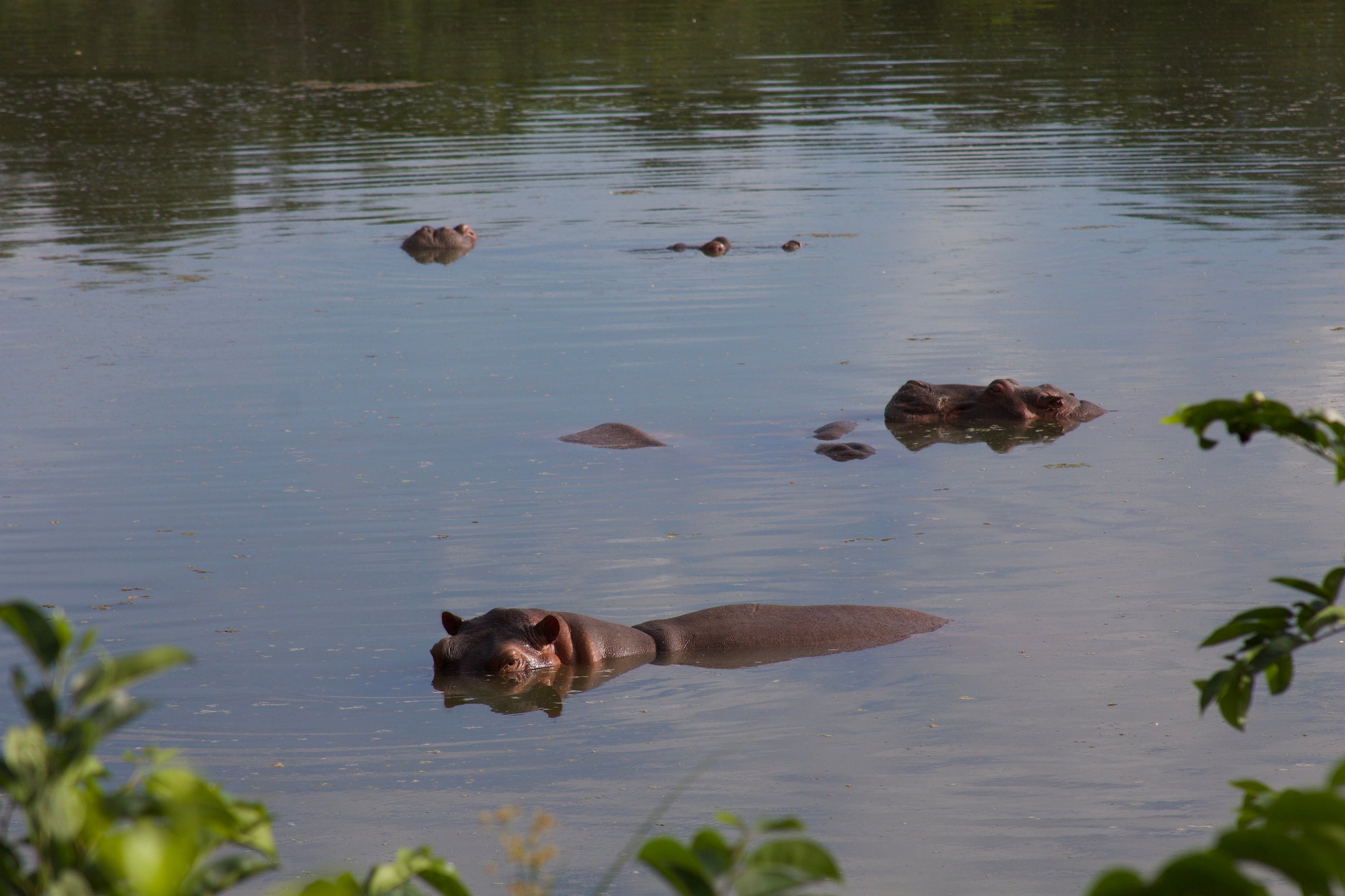This is the story of Diego and Marcela, who belong to one of the families that live near the hippos on the grounds of the former Hacienda Nápoles, a large farm owned by drug trafficker Pablo Escobar. Through the flavor and aroma of chocolate, they want to tell a different story of a territory once associated with drug trafficking and violence.
Five years ago, Diego and Marcela radically changed their lives. After living comfortably in the urban area of the municipality of Puerto Triunfo (Antioquia, Colombia), they decided to move to Diego's parents' farm to help them with the cocoa crops. His father was ill and could not continue to manage the farm. This is how they left the comforts of urban life and faced the challenge of running the family farm.
This is how Diego and Marcela arrived at the Nápoles village, located in the municipality of Puerto Triunfo in the Magdalena River basin. Their first challenge was facing the consequences of the Monilla fungus, a severe disease that affects crops. As a result, the family lost 90% of its capital and had to invest much effort and money in recovering the cacao plant. Over time, they learned to control the fungus, and after a few months, they were able to reestablish the crops and harvest the first fruits. Since 2018, they started processing cacao fruits into “chocolate de mesa,” a special product used by Colombians to prepare hot chocolate. Currently, they transform and package 50 kilograms of chocolate per month.
Recovering the crops from the disease was not the only challenge Diego and Marcela faced upon their arrival at the farm. Upon moving to Nápoles, they had to learn to live with hippopotamuses, animals unusual in the Colombian landscape that are running wild in this village.
The unusual presence of hippos in Colombia is related to the history of drug trafficking and the armed conflict. Forty years ago, four small hippos were illegally imported by Pablo Escobar as part of his project to build an open-door zoo on his huge Hacienda Nápoles estate, located where Diego and Marcela live today. Escobar's Hacienda Nápoles was home to 1,200 exotic animals, among many other luxuries and eccentricities. The former hacienda included artificial lakes where the aquatic animals lived. After Escobar's death in 1993, Hacienda Nápoles was abandoned. Most animals died due to lack of care, and others were transferred to zoos. Only the hippos remained, sheltering in the lakes.
In 2000, the Colombian government took control of this property after a lengthy legal process. Four years later, the entity in charge of administering the assets seized from drug traffickers divided the three thousand hectares that made up this property, giving part of the land to the Colombian institution in charge of prisons to construct a medium-security prison. In 2005, another piece of the property was given to the municipality of Puerto Triunfo, which retained ownership of the land but distributed the rights to use it. Part of the property was allocated to families displaced by violence and climatic conditions. The remaining portion was granted to a company to construct a large amusement park, which began operations in 2007.
In a short time, this company established a new landscape in the area, intending to eliminate the residues of Pablo Escobar's past and drug trafficking: the airstrip was transformed into a water park, the garage where Escobar's car collection was kept became a museum that aims to honor the victims of drug trafficking and Escobar's mansion became an attraction that tells the story of Vanesa, a small hippo that has become the park's mascot. The company also imported African animals to create a new zoo. The lakes created by Escobar to house his animals were divided between the amusement park and the land given to farmers. During the following years, the hippopotamuses continued to breed and move between these lakes. Scientists have counted 169 hippos distributed in the middle part of the Magdalena River, of which approximately 100 inhabit the lands formerly part of the Hacienda Nápoles.
Amusement Park Hacienda Nápoles, Puerto Triunfo (Colombia)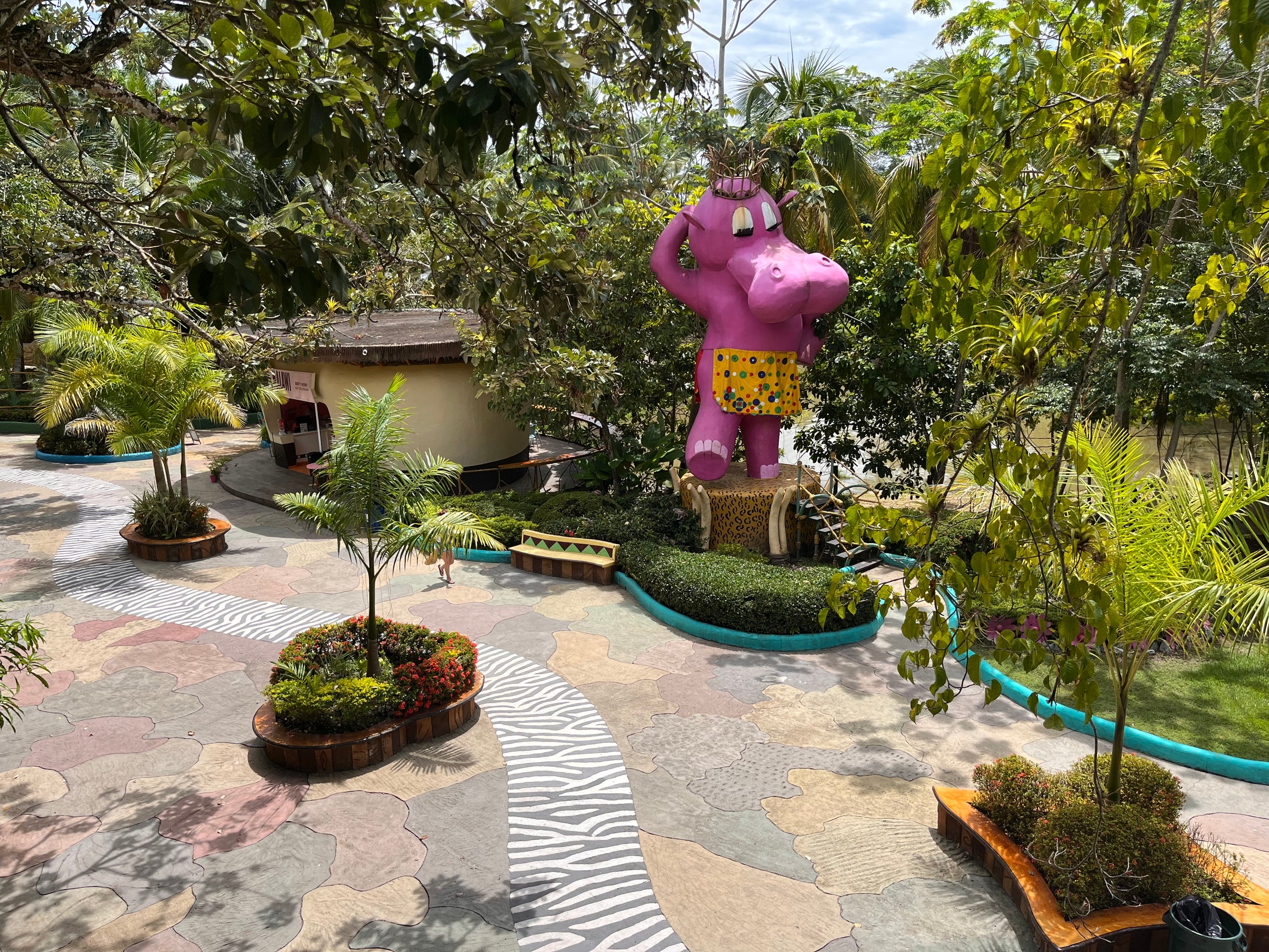
Vanessa, a hippopotamus living in captivity at Hacienda Nápoles Amusement Park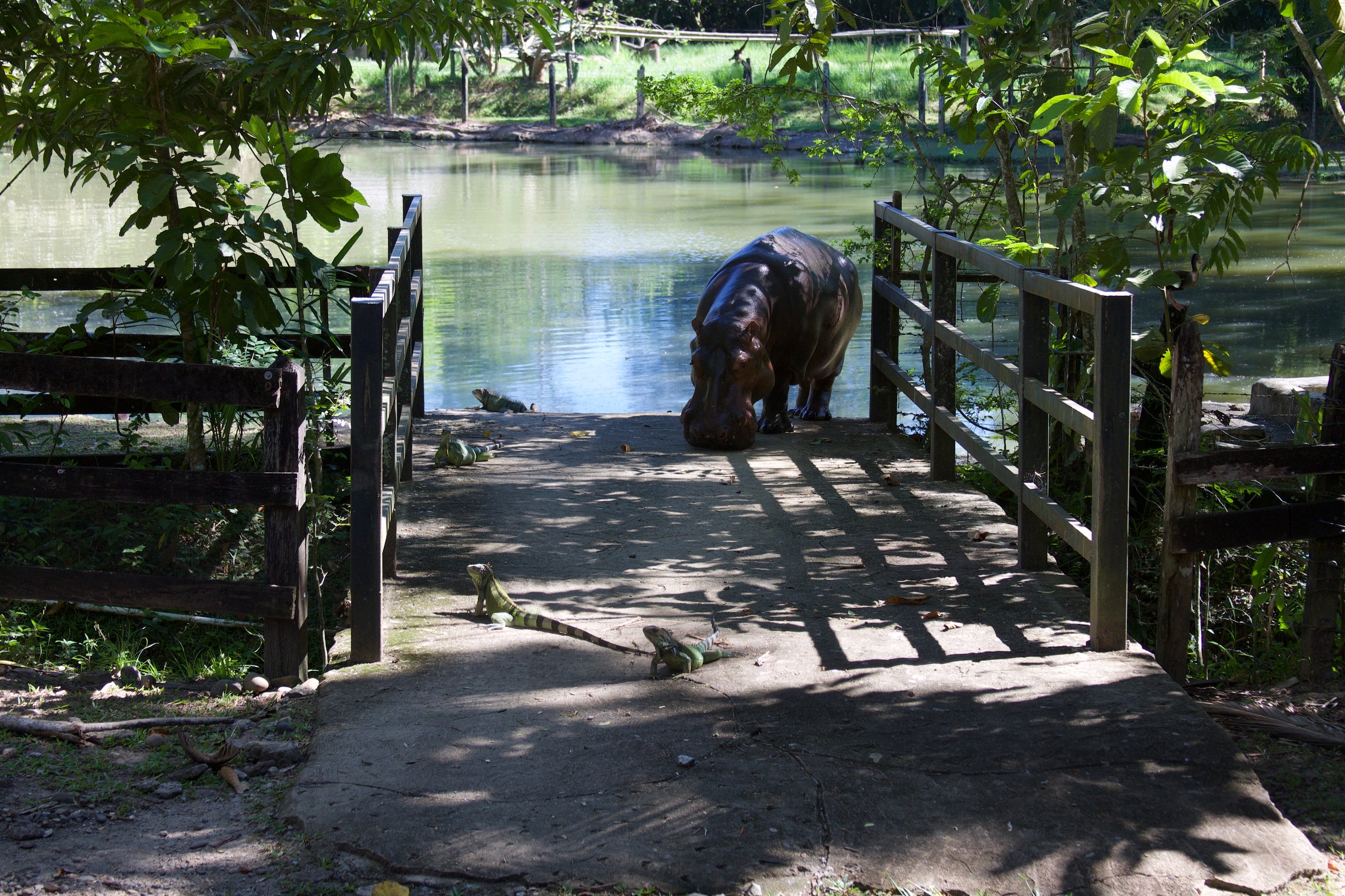
Diego's parents were among those families who were awarded land use rights on the former Hacienda Nápoles in 2004. Before this, they lived on an island in the Magdalena River, growing bananas, yucca, and corn. Generally, these islands are flooded in the winter, which causes sediment from the river to fertilize the soil and create optimal crop conditions. However, living in these areas is considered high risk, as people and crops are vulnerable to extreme weather events. For this reason, the municipality offered to relocate them to the former Hacienda Nápoles and support them in growing different crops such as cocoa and lemons.
Currently, about 200 families live on the land that used to be part of the hacienda and develop their productive projects in the middle of the amusement park and large cattle ranches that determine the region's economic, social, and ecological dynamics. They also share the territory with the hippos that travel between the park's lakes and the trail. The families living on the park's borders recognize they came to these lands after the hippos. They have learned to coexist with them, and some are grateful for their presence in the lakes because they attract tourists to the area, which helps boost the local economy. In addition, they have incorporated them as part of their identity and sense of belonging to the place, a feeling that aims to leave behind the history of drug trafficking and violence.
This is why Diego explains that they intend to tell another story about Nápoles through the Chocolates Nápoles brand. This family wants to share with local inhabitants and tourists another tale of Nápoles that is not associated with drug trafficking and the memory of Pablo Escobar. It is a story that does not ignore the violent and troubled past of the region, and that opens up possibilities to think of other ways of describing this place and the people who live there. They want to do it through the aroma and flavor of cacao, a plant that they describe as resilient as the inhabitants of Nápoles because both can recover from difficult situations and flourish again in adverse conditions.
Diego, Marcela, and their children in the cocoa fields. Photo by Diego Marín.
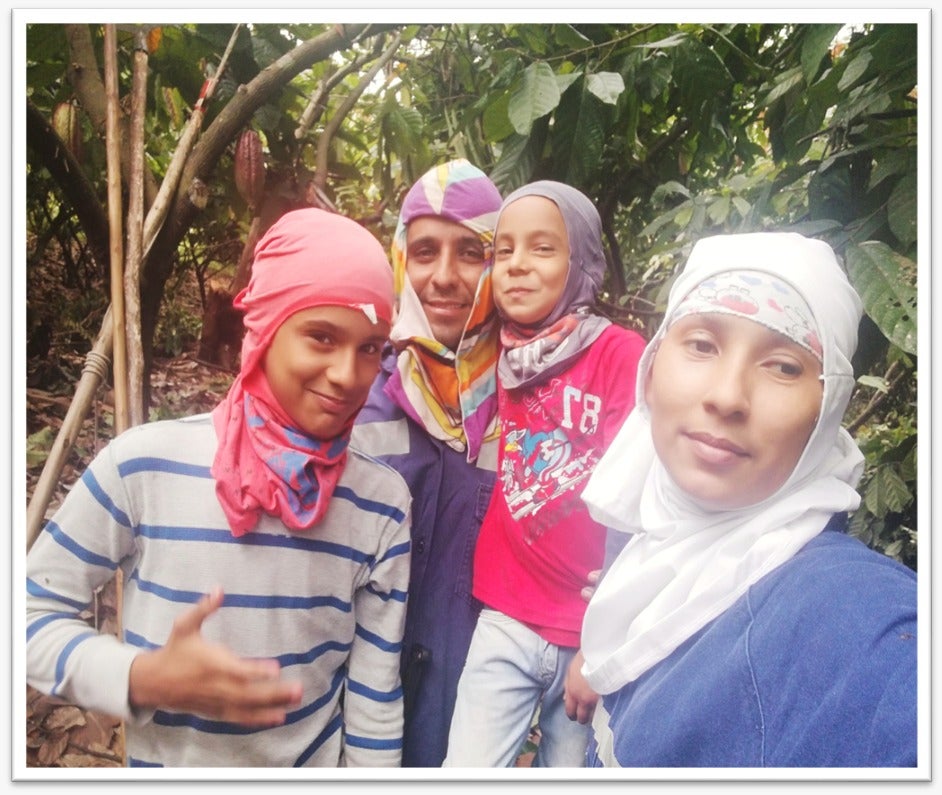
Cocoa fruits on Diego and Marcela's farm. Photo by Diego Marín.
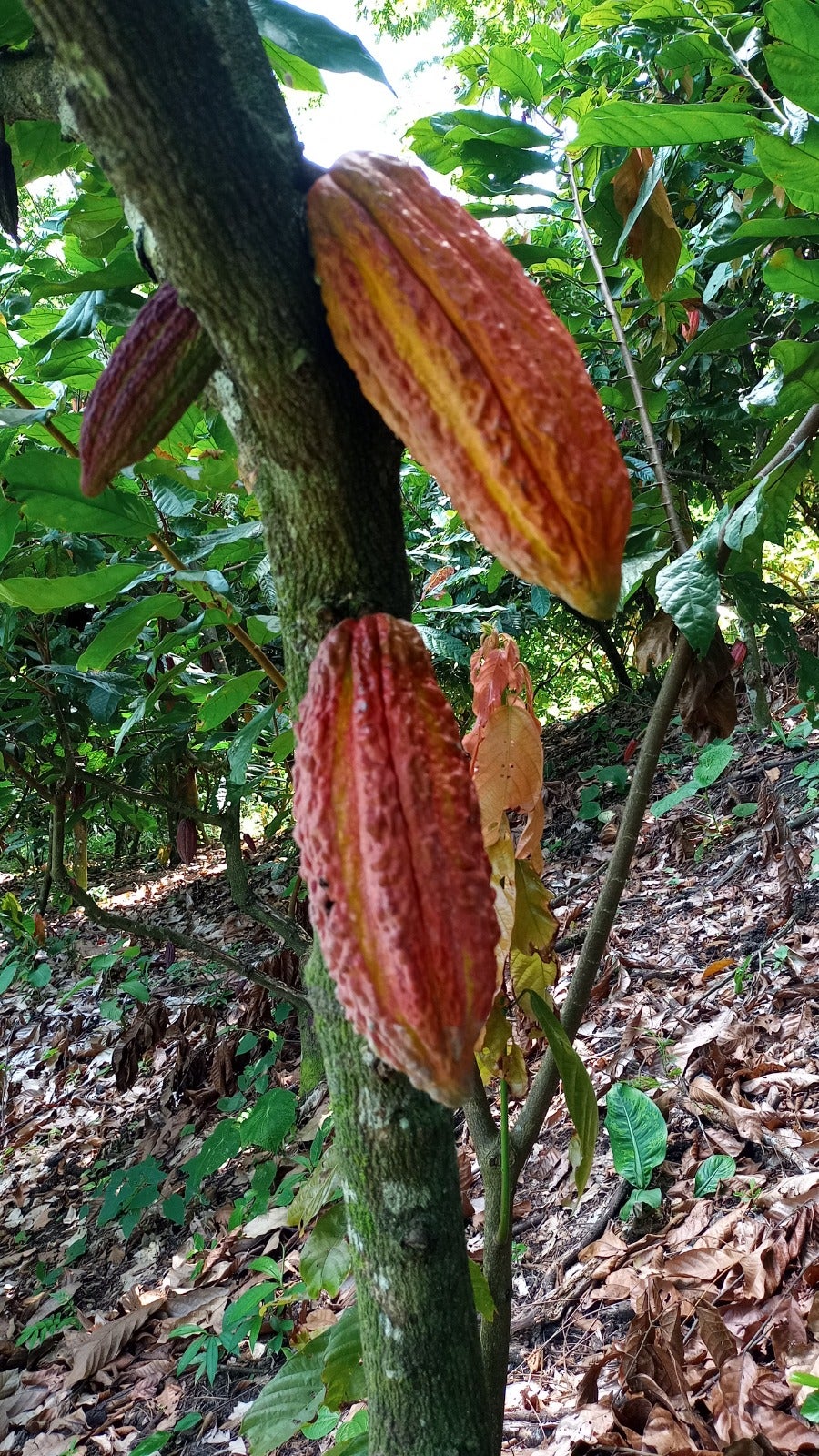
Marcela with a cocoa fruit. Photo by Diego Marín.
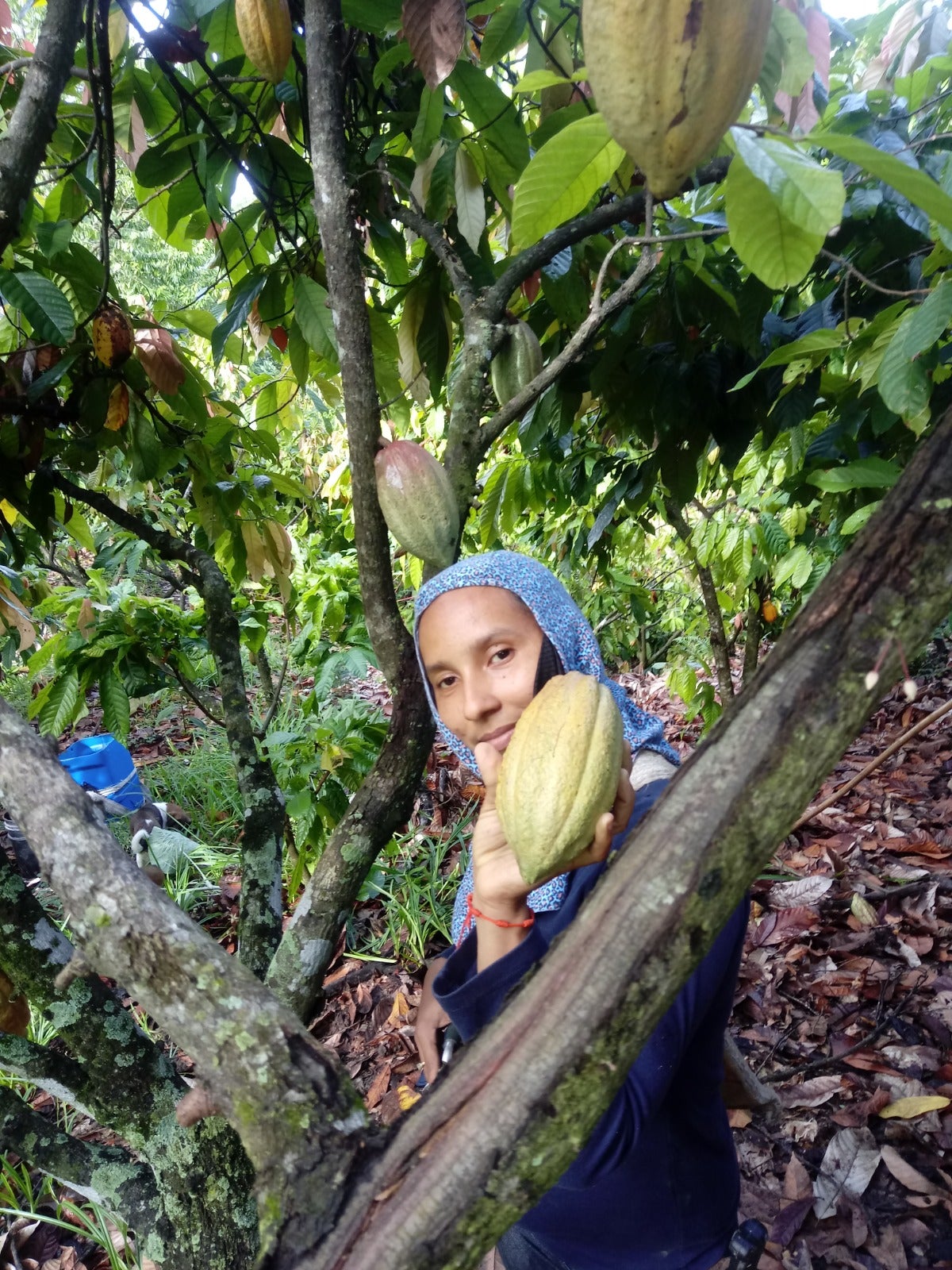
Chocolates Nápoles is more than growing and processing cacao. Diego and Marcela are developing other projects to complement the family economy and care for the farm's forest. Thanks to her studies at the National Learning Service (Servicio Nacional de Aprendizaje), Marcela is learning how to raise native chickens with high animal welfare standards. Thus, marketing the chickens and hens will allow them additional income and greater economic stability. They have also begun a process of recovery and care of the forest surrounding the cocoa crops and the chicken farm, participating in a restoration program called Masbosques. Supported by the environmental authority Cornare, they are implementing agroforestry systems to recover the trees surrounding the crops through the interspersed planting of cocoa plants and timber trees that can be used in the future. This increases the farm's vegetation cover and protects the cocoa crops. This has also allowed animals such as different species of monkeys, ocelots, foxes, and otters to return to the areas around Hacienda Nápoles.
Chicken farm on Diego and Marcela's farm.
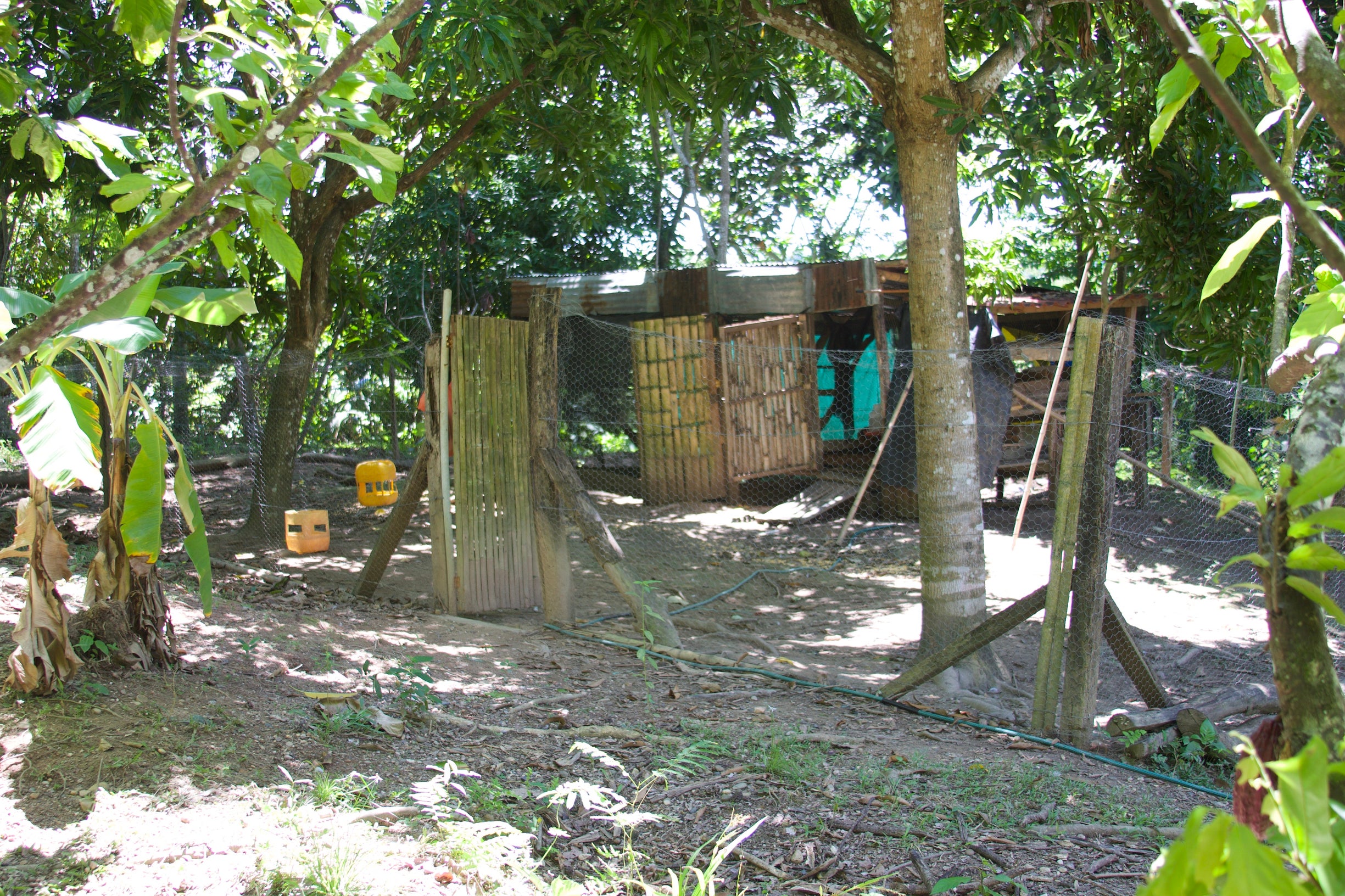
Howler monkey on Diego and Marcela's farm
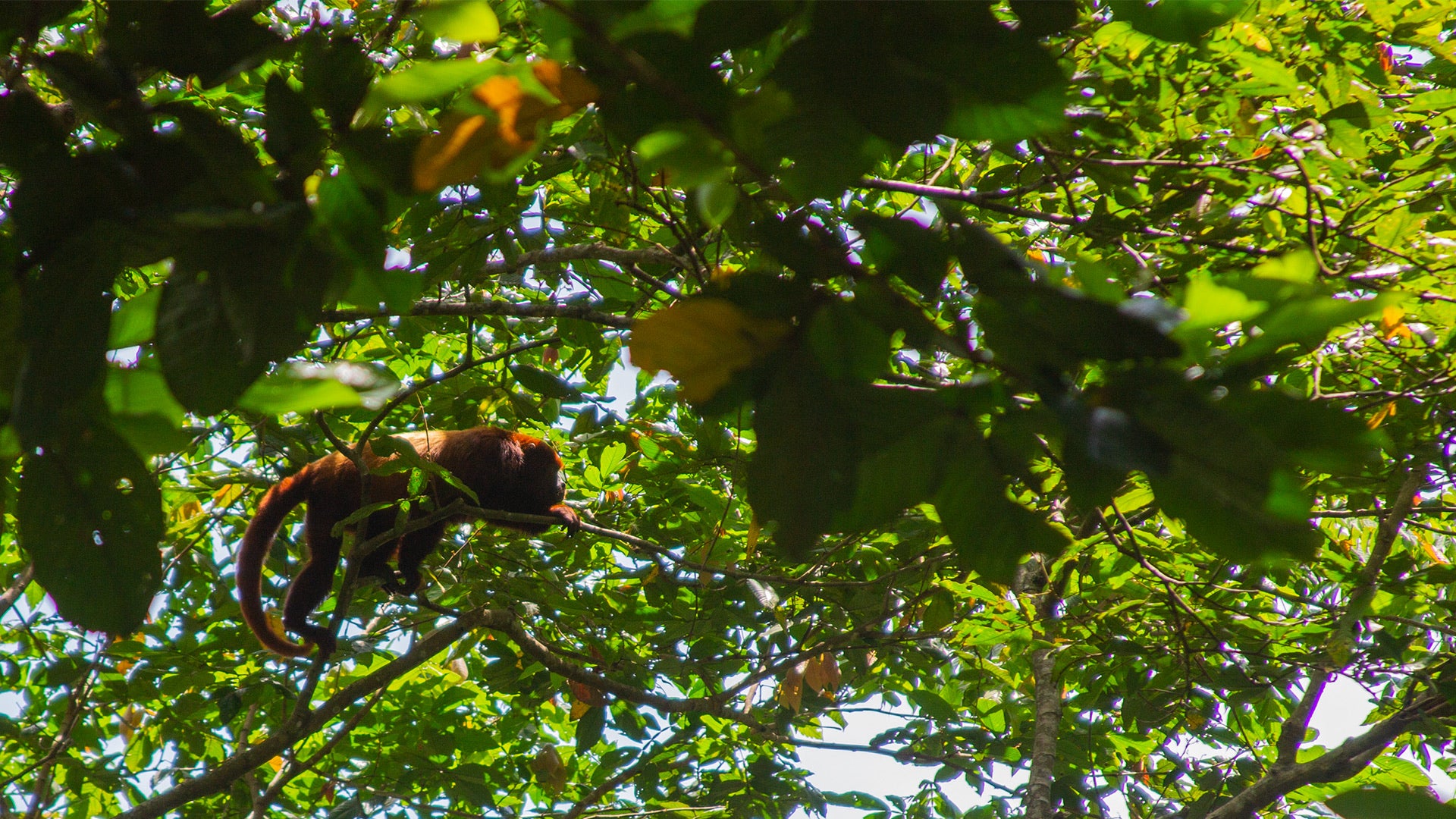
Chocolates Napoles by Diego Marin
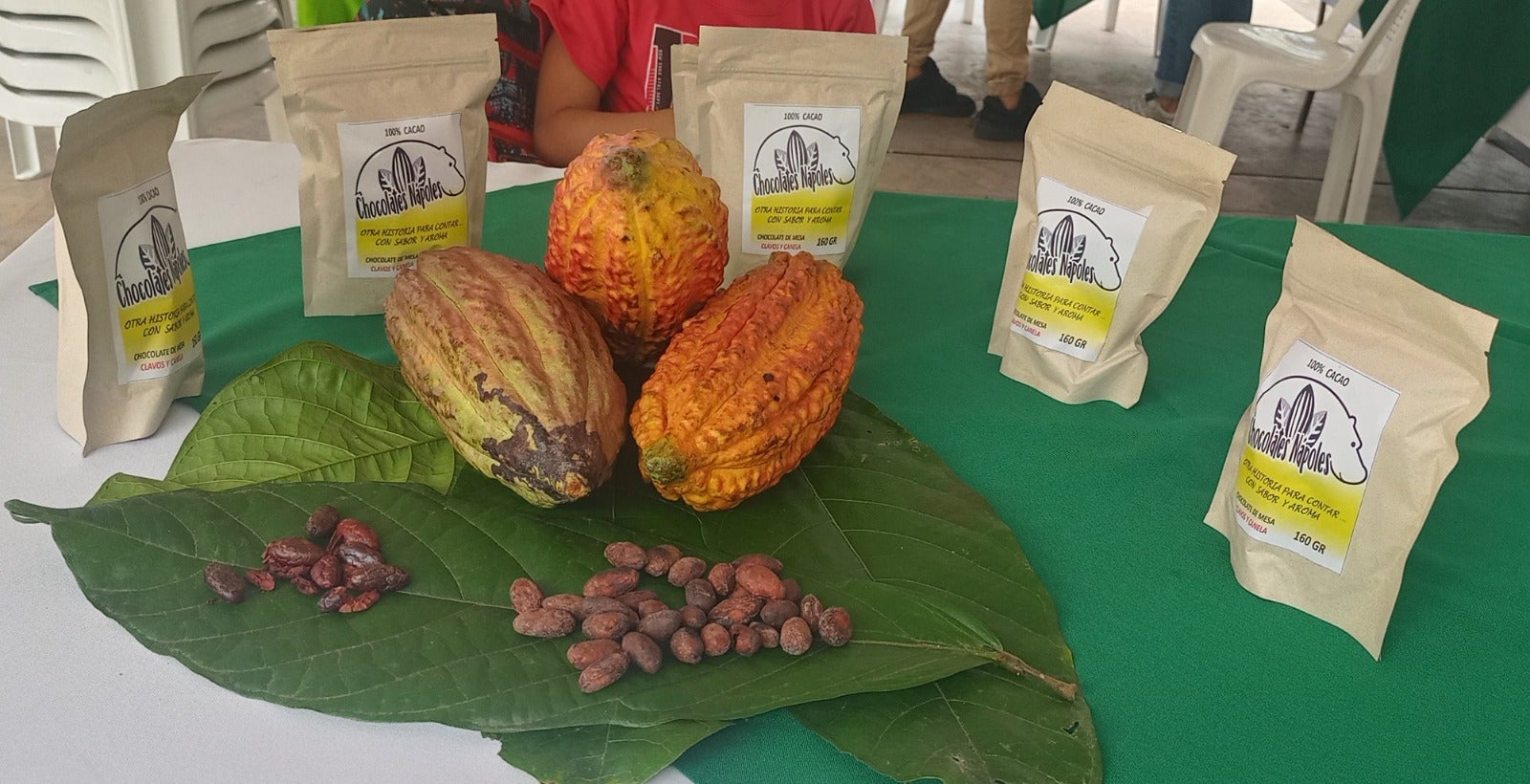
Marcela says that more and more new animals are arriving on the farm. Among them is a family of howler monkeys that peek through her window and roam the fields where the chickens are kept. However, these visits also pose challenges to coexistence because these monkeys and other forest animals like to consume the ripe fruits of cocoa and other fruit trees. They may also damage the hens’ eggs. Although this may be a source of conflict for some, for Marcela and Diego, it is simply another challenge of living in Nápoles. Gradually, they have learned to protect the chicken farms with fences to prevent monkeys from entering. They also carefully pick the cacao fruits when they are just ripe to minimize losses. Although these precautions involve more work and effort, they are strategies that allow them to coexist with the animals.
Diego and Marcela have many ideas for their future in Nápoles. They envision an agroecological farm that, in addition to producing cocoa and processing chocolate, can show tourists what it is like to live in the countryside among crops, forests, and animals. They also want to increase cocoa processing volumes, allowing them to buy cocoa from their neighbors and thus boosting the local economy. For now, they are in the process of rebranding. When Chocolate Nápoles started four years ago, they decided to include an image of a hippo to represent the place where the cacao is produced. However, they realized that this figure in the logo lends itself to confusion, as not all consumers identify the association between these animals and the chocolate they enjoy. Therefore, they are designing a new logo highlighting the cocoa plant and its colors. However, the product will continue to be called Chocolates Nápoles to recognize the history of the hacienda, but above all, to build a different present and future for the region.
ANOTHER STORY TO TELL...
WITH FLAVOR AND AROMA
(Chocolates Nápoles Slogan)
------
I traveled to Colombia supported by the Expanding Horizons Fellowship 2023-2024, generously funded by Rice alumnus Dr. Walter Loewenstern. This trip is part of the preliminary fieldwork for my Ph.D. dissertation in Anthropology that examines the controversies between scientists, policymakers, animal rights advocates, and local communities over hippo population control and the care of the Magdalena River's water resources. Through participant observation, interviews, and media analysis, this research analyzes how these different actors understand and experience hippos' current and future presence in Colombia and how they define complex and contradictory ways of caring for these aquatic environments.
About the author:
Alejandra is a current Ph.D. student in the Anthropology program. Read more.
Further Reading:
Research and Explorations in Community Ecology
Understanding Cervical Cancer in Mozambique: A Research Expedition
Exploring the Unseen Strains – A Deep Dive into Research on Musician Injuries

